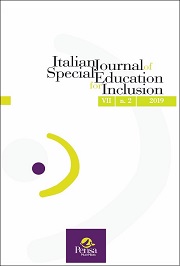Barriere all’attività fisica di giovani adulti con disabilità intellettiva percepite dai loro genitori e allenatori
DOI:
https://doi.org/10.7346/sipes-02-2019-27Abstract
Physical activity (PA) is essential for promoting well-being, health, and positive social relations. Nevertheless, in industrialized countries, high levels of physical inactivity are reported, with higher
levels in people with disabilities. People with intellectual disability (ID) are characterized by particularly high inactivity rates and have various barriers to regularly participating in PA. The aim of
the present research was to explore the barriers to PA of young adults with ID perceived by their parents and sports coaches. The cross-sectional study involved 52 parents and 9 coaches, who provided information on 55 young adults with mild or moderate ID, filling two separate questionnaire packages, one for parents and the other for coaches.
The main reported barriers were the low number of available PA programs, the prejudice toward the disability, the level of expertise of the sports coaches, and the lack of motivation to PA practice of people with ID.
The intervention trajectories are therefore multiple including actions on policies at a general and a local level (PA programs availability and accessibility seem intervention targets), educational actions to promote inclusion and reduce stigma, and programs to support parents and to improve the relational and teaching abilities of coaches.


